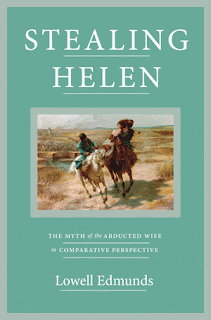 He applied the “Page 99 Test” to his new book, Stealing Helen: The Myth of the Abducted Wife in Comparative Perspective, and reported the following:
He applied the “Page 99 Test” to his new book, Stealing Helen: The Myth of the Abducted Wife in Comparative Perspective, and reported the following:On page 99 I am just short of the end of my chapter 2, on Helen’s twin brothers, Castor and Polydeuces. The structure of this chapter mirrors the structure of my book as a whole, and so Ford Madox Ford was right.Learn more about Stealing Helen at the Princeton University Press website.
In chapter 1, I have established, mainly on the basis of folktales (printed in an appendix), an international story that I call the “The Abduction of the Beautiful Wife.” With reference to this story, I criticize various claims (I call them hypostatizing) made about Helen. In chapter 2 it’s Helen the Indo-European dawn goddess whom I call into question.
In chapter 3, I return to my positive thesis and show how the Greek myth of Helen’s abduction by the Trojan Paris (also called Alexander) conforms to the pattern of “Abduction,” right down to the stratagem that the husband always needs in order to recover his wife. In the ancient Greek version, it’s the Trojan Horse. Then in chapter 4 I criticize two other hypostases of Helen. One is the Helen of cult. She is regularly called a “goddess.” I cast doubt on this idea. The other Helen, a creature of literary criticism, has a self and a personality and is tantamount to a character in modern fiction.
As against the “real” Helens of these hypostases, in my concluding chapter 5 I reaffirm—back to the positive—the Helen of narrative, who was appropriated again and again in ancient Greece, not only in poetry of various kinds but also in local legends, as in some examples from the island of Rhodes. Rhodians wanted to attach to themselves some part of her fame. These are new Helens, and each one is for the locals the real Helen. But the most interesting of these Helens, about which I wish that we knew more, might be the Helen of the Pythagoreans of Croton (southern Italy). She came from the moon and returned there when her mortal life was over. This Helen reappears in the propaganda of Simon Magus. From him, I trace a line that leads on to Goethe’s Faust.
--Marshal Zeringue



